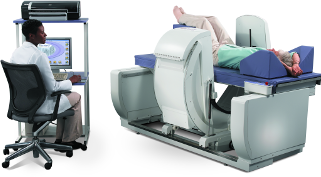Home > Imaging & Radiology > Imaging Services > Bone Densitometry
Bone Densitometry
Bone Densitometry
Bone Densitometry has become the gold standard for measuring the density of your bones. Sometimes referred to as DEXA (dual energy x-ray absorbtiometry) scan, bone densitometry is the test for the evaluation of osteoporosis (the loss of bone minerals.) The results of your exam are compared to others whose age, sex and ethnic background are similar to yours. The measurement of bone mineral is very closely related to bone strength and your potential for bone fracture. As men and women age, their risk factors for osteoporosis increase. Common risk factors include:
- Postmenopausal, including early or surgical
- Age
- Previous bone fracture
- Family history of osteoporosis
- Certain medications
- Caucasian or Asian decent
- Thin or small build
- Eating disorder
- Smoking
- Alcohol abuse
- Inactive lifestyle
- Low calcium intake
- Vitamin B deficiency
DEXA uses low-dose x-ray that checks for signs of mineral loss and bone thinning. We commonly scan your hip, spine and/or wrist for this exam. DEXA is a simple and painless test that takes about 15 minutes while you lie comfortably on our table. Metal buttons, buckles or zippers interfere with the test so you may be asked to change into a gown. Our radiologist will interpret the results of your scan and send the results to your provider. S/he will discuss the results with you. After an initial DEXA scan is done, subsequent tests are useful to monitor your rate or response to therapy to slow bone loss.
Our DEXA system at CPH also has the ability to perform an accurate assessment for Body Composition Analysis (BCA.) These scans are performed in a fashion similar to a DEXA study. For more than three decades the prevalence of obesity has increased rapidly among both adults and children. Today, more than two thirds of U.S. adults are considered overweight or obese and more than 97 million Americans are affected by obesity related illnesses. The demand for accurate body composition analysis is growing as health care providers realize its value in identifying serious health risks that result from obesity including heart disease and type 2 diabetes. The BCA scan produces color images displaying the distribution of fat, lean tissue and bone and translates the information into a report that lets you know exactly how you’re progressing towards your weight management goal. You do not need a physician’s order for the BCA evaluation.

